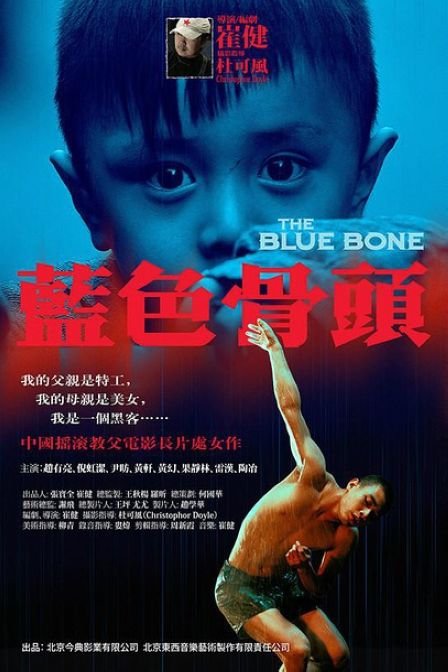
【電影簡介】
主人公鐘華(尹昉飾演)是一個生活在都市中的網絡寫手,同時也是地下搖滾歌手和專業黑客,為了生計不得不幫音樂公司的老板做些“五毛黨”的勾當,日子過得很宅,如果說有什么幸運的事兒,就是他勾搭上了一個沒出名的小歌手萌萌(黃幻飾演),而不幸的是,那個小歌手卻是老板的情人……對于性和愛情其實分的不很清楚的鐘華為了“還債”答應音樂公司的老板盡力把小歌手捧紅,而這時他接到了多年沒有音訊的父親發來的郵包,在郵包里竟然藏著一段在文革歲月中的凄婉故事……
“一首歌,兩代人,三段故事,四種曲風”,這是崔健對《藍色骨頭》極為簡練的介紹,后來,他又多透露了點內容,這部電影在他2005年制作專輯《給你一點顏色》時就已經成形,電影講述了一個擁有多重身份的年輕男子鐘華,勾搭了一個小歌手萌萌,但萌萌卻是老板的情人……鐘華父親的一個郵包又牽出文革期間的一段凄婉故事。
電影將分為三個篇章,《藍色骨頭》這首歌貫穿始終。在電影《藍色骨頭》中,觀眾將聽到四種曲風的《藍色骨頭》。這首歌是崔健2005年專輯《給你一點顏色》的主打歌,也是他個人以搖滾的態度看人生的真實寫照。
【音頻文本】
When I heard about rock star Cui Jian's first feature film "The Blue Bone", my first reaction was to dismiss it as just another piece of amateur nonsense by someone trying to cash in on China's fast expanding film market. Heaven knows we've had enough of those recently. But before I even finished the film, I had begun to regret my narrow-minded assumption, "The Blue Bone" is one of the best directorial debuts in years, or at least it is better than the products of some who label themselves professional directors.
The story is mostly about how two generations of Chinese musical talents struggle to fit in their times. Ni Hongjie plays a young woman in the 1980s who was expelled from an art troupe for writing a song of certain bold content. She was married to a man of secret service, but the temporary union eventually broke down.Decades later when their son became a young adult, he picked up his mother's tabooed song and at an underground concert spoke of his own life and dream as a misfit in the modern context. Meanwhile, the family's story is completed by a storyline about the father, who spent his entire life guarding the secret of a handgun and its damages on himself.
China is going through rapid changes, changes that have moved Cui Jian and his songs to the category of nostalgia. Personally I've never listened attentively to his songs, it is only for the purpose of writing this review that I took quite some time reading his resume and warming up to his rich melodies and lyrics. His rise to stardom in the 1980s may have been the result of the country's opening-up and his diligent study of western styles, but he has also most assuredly proven his personal taste by the original ideas and sensitivity in his literary lyrics.
That taste is also present in his cinematic creation. With the help of cinemagraphor Christopher Doyle, Cui Jian offers eloquent images imbued with rich symbolism and powerful sentiment. Throughout the film, the characters perform Cui Jian's songs twice: "Lost in Season" and "The Blue Bone", both are loaded with explosive passion.
The non-linear narrative is a significant part of the film in the sense that it highlights the characters'difficulty with the world around them. It also breaks up the storytelling and makes it seem disorderly forimpatient viewers who know little and care less about the history of contemporary China.
"The Blue Bone" is not easily accessible due to Cui Jian's unique style and the setback in the narrative, it may not be the most profitable movie in the box office, some critics may even frown upon it to look smart. But it is not wise to discourage conscientious first timers, not when good taste is hard to find in the age of gold rush in China's movie industry.
輕松調頻EZFM 微信mrweekly











